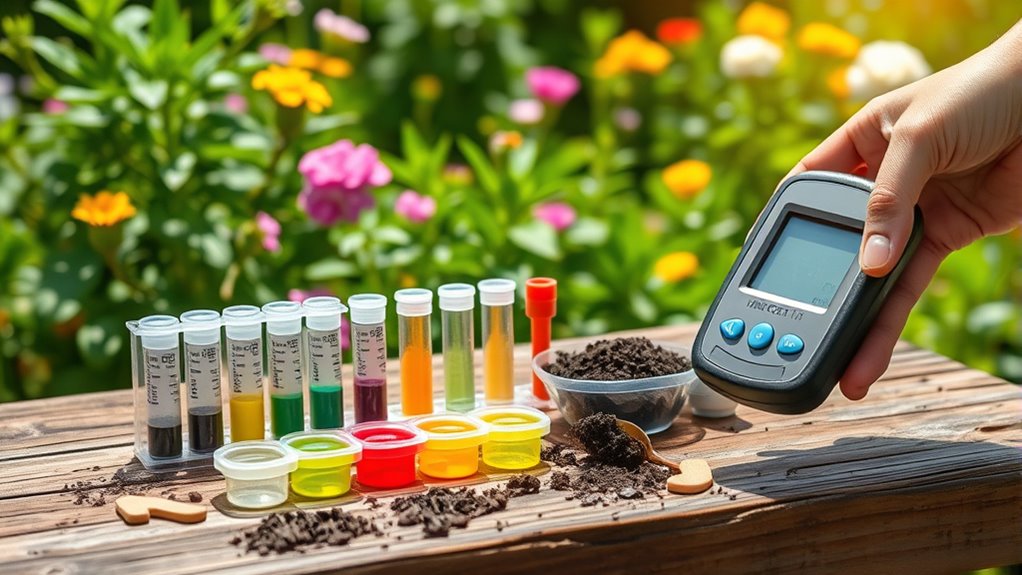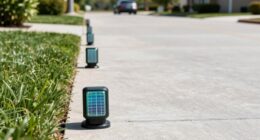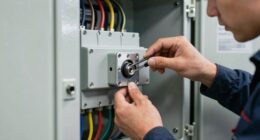To grow a thriving garden, I recommend checking out the top soil test kits that measure soil pH, nutrients, moisture, and temperature. These kits include options like 3-in-1, 4-in-1, and 6-in-1 devices, offering quick and accurate results for both indoor and outdoor plants. They’re easy to use and help you optimize your soil conditions. If you want detailed insights and tips, keep exploring further to find the best fit for your garden.
Key Takeaways
- Choose kits that test for essential nutrients like nitrogen, phosphorus, potassium, and pH for comprehensive soil health analysis.
- Opt for user-friendly kits with clear instructions, suitable for both beginners and experienced gardeners.
- Consider options with digital displays or colorimetric results for quick, accurate readings.
- Look for professional lab-verified kits for detailed analysis and tailored fertilization recommendations.
- Select kits with durable accessories and multiple tests to monitor soil conditions over time effectively.
3-in-1 Soil Test Kit for Garden and Lawn Care
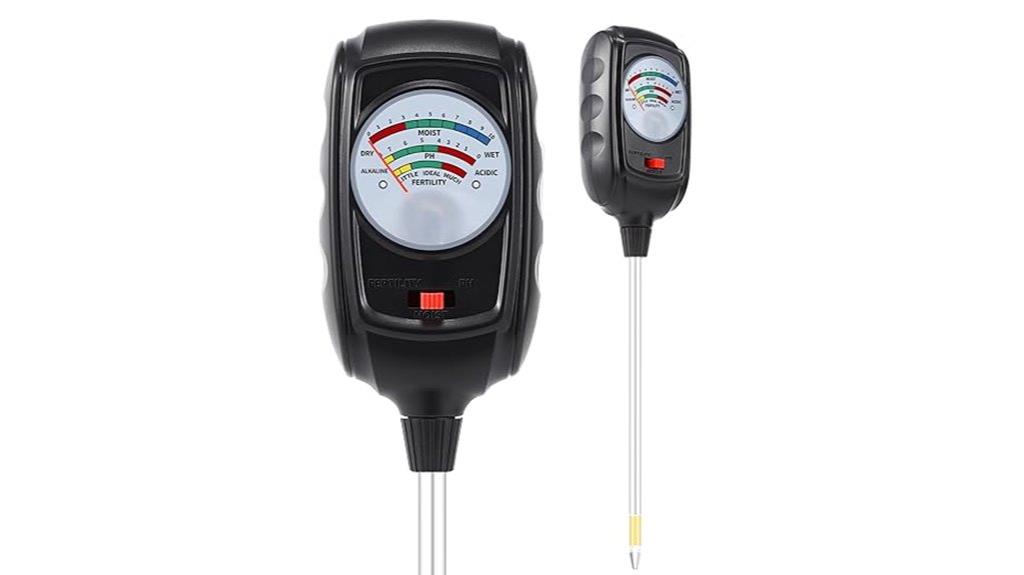
If you’re a gardener or homeowner looking for an easy-to-use, all-in-one soil testing solution, the 3-in-1 Soil Test Kit is an excellent choice. It combines a soil moisture meter, pH tester, and fertility tester in one device, suitable for garden, lawn, indoor, and outdoor use. The metal probe is durable, corrosion-resistant, and provides quick, accurate readings without batteries. Simply insert the probe into soil, and the pointer shows your results immediately. Its bright colors improve visibility, even in low light. This kit makes testing straightforward, helping you optimize watering, pH, and soil health to support healthy plant growth.
Best For: home gardeners, lawn enthusiasts, and indoor plant lovers seeking an easy, all-in-one soil testing solution for optimal plant health.
Pros:
- Combines soil moisture, pH, and fertility tests in a single, convenient device
- No batteries needed; provides immediate, accurate readings with a clear pointer
- Bright color scheme enhances visibility, especially in low light conditions
Cons:
- May have limited sensitivity compared to higher-end soil testing models
- Not suitable for testing water, rocky, sandy, or overly loose soil types
- Some users report inconsistent readings or difficulty seeing the needle in certain positions
Soil Moisture Meter, 4-in-1 Soil Test Kit for Garden, Lawn, Farm, Indoor & Outdoor

The Soil Moisture Meter, 4-in-1 Soil Test Kit is an ideal choice for gardeners, farmers, and indoor plant enthusiasts who want quick, detailed insights into their soil conditions. It measures moisture, pH, nutrients, and light levels simultaneously, giving you a thorough view of your soil’s health. The durable, single-probe design minimizes root damage, while the patented 90° rotating head allows easy reading without bending. No batteries are needed, making it portable and simple to use indoors or outdoors. Just insert the probe deeper than four inches for instant results. Plus, it includes a free plant growing guide and sandpaper for maintenance, ensuring accurate and reliable performance.
Best For: gardeners, farmers, and indoor plant enthusiasts seeking a comprehensive, easy-to-use soil testing tool for quick and accurate soil condition analysis.
Pros:
- Measures moisture, pH, nutrients, and light levels simultaneously for a comprehensive soil assessment
- Durable single-probe design with a patented 90° rotating head for easy reading and minimal root damage
- No batteries required, making it portable and convenient for both indoor and outdoor use
Cons:
- Needs to be inserted deeper than 4 inches for accurate results, which may be challenging in very dense or rocky soil
- Regular cleaning with sandpaper is necessary to maintain optimal performance
- Limited to soil testing; cannot be used for other materials or mediums
MySoil Soil Test Kit for Lawn & Garden Nutrients and pH
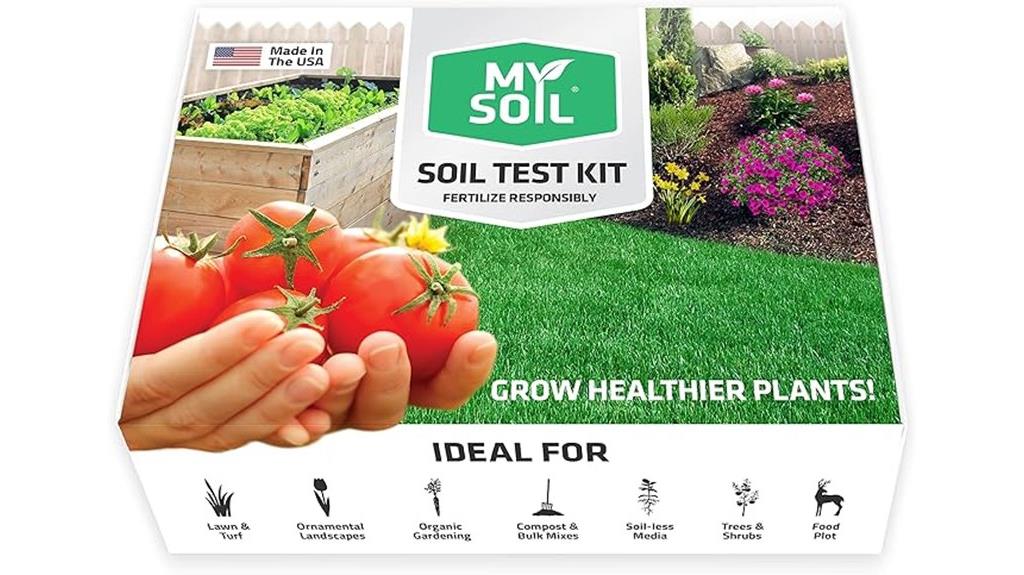
For gardeners seeking precise soil insights, the MySoil Soil Test Kit stands out as an ideal choice due to its extensive analysis of 13 nutrients and pH, delivered through professional lab results. It’s suitable for lawns, vegetables, flowers, trees, and more. The kit provides detailed recommendations tailored to your soil and plant needs, helping you optimize fertilization while saving money and avoiding over-application. Results arrive in 6-8 days via online access, with clear guidance on what, how much, and when to apply. Users praise its ease of use, fast turnaround, and the ability to improve plant health with targeted amendments.
Best For: home gardeners, landscapers, and small-scale growers seeking accurate, comprehensive soil testing to improve plant health and optimize fertilization strategies.
Pros:
- Provides detailed analysis of 13 nutrients and pH with professional lab results within 6-8 days.
- User-friendly with clear instructions and straightforward sample collection process.
- Helps save money and prevent over-fertilization by offering tailored application recommendations.
Cons:
- Only available for U.S. customers; limited or unavailable for users outside the U.S., especially in Canada.
- Prepaid mailing envelope is restricted to U.S. addresses, which can add inconvenience or extra costs for international users.
- Some users suggest including additional sampling tools or accessories for easier soil collection.
4-in-1 Soil Test Kit for Indoor and Outdoor Plants
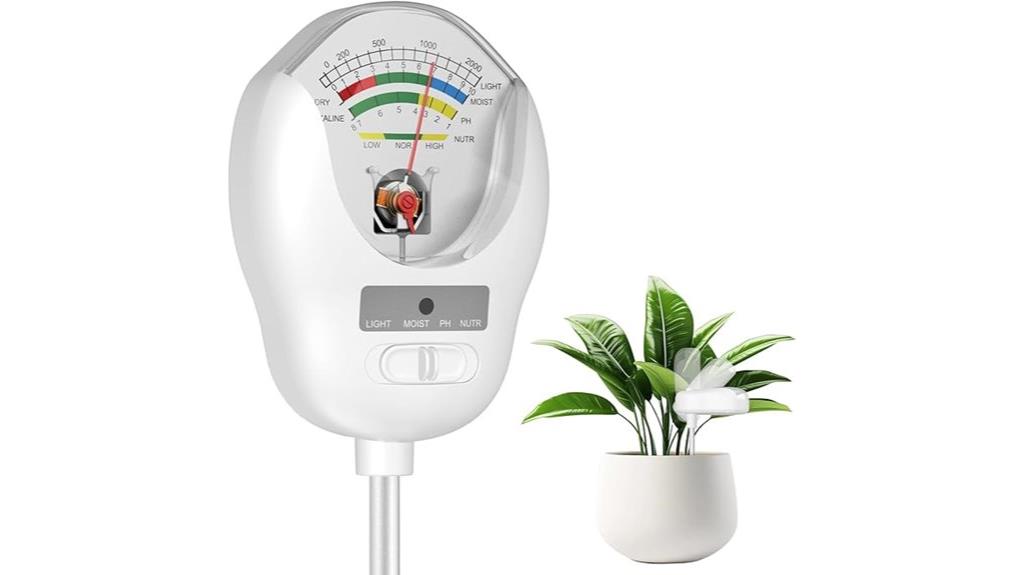
Looking for a soil test kit that simplifies plant care both indoors and outdoors? The 4-in-1 Soil Test Kit is perfect for that. It measures moisture, pH, light, and nutrients in one device, giving instant results without batteries. Its upgraded probe easily penetrates tough soil while protecting roots, making it suitable for houseplants, lawns, and greenhouses. The foldable, adjustable probe simplifies reading, even for seniors. Just select the mode, insert it 2.5 inches into the soil, and get quick feedback. Lightweight and durable, it’s a versatile tool that helps prevent overwatering and optimize plant health across various settings.
Best For: home gardeners, indoor plant enthusiasts, and outdoor landscapers seeking a quick, easy-to-use soil testing solution without batteries.
Pros:
- Combines moisture, pH, light, and nutrient testing in one device for comprehensive soil analysis
- No batteries required; instant results with an upgraded, easy-to-penetrate probe
- Lightweight, durable, and suitable for various settings including indoor plants, lawns, and greenhouses
Cons:
- Short probe length (6 inches) may not be ideal for deep or large pots
- Occasional reports of non-responsive needles after extended use
- Limited suitability for very dense or rocky soils requiring deeper testing
Rapitest Soil Test Kit for Gardens, Vegetables, Flowers and Lawns
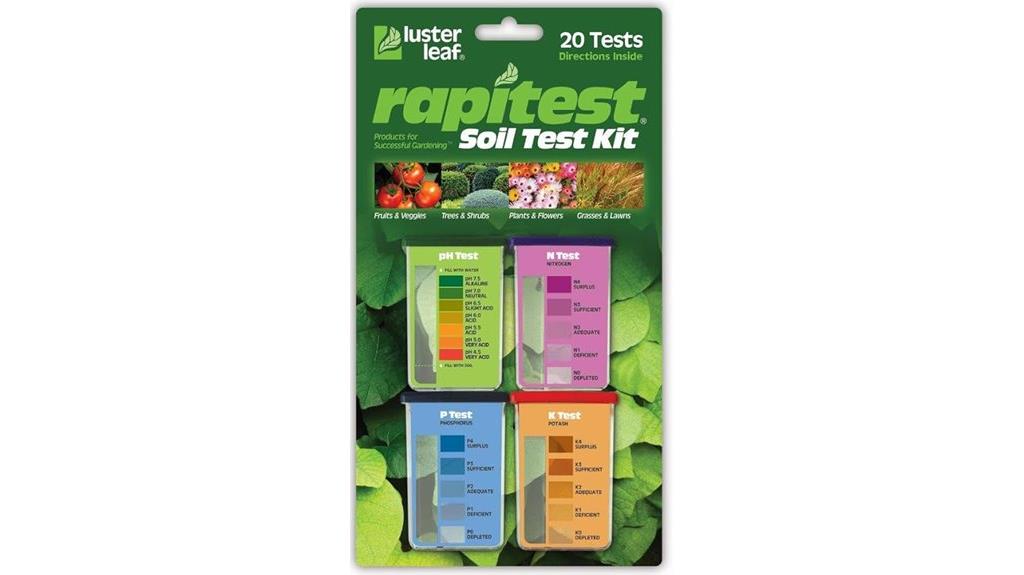
If you’re a gardener seeking an easy and reliable way to assess your soil’s health, the Rapitest Soil Test Kit is an excellent choice. Made in the USA, it offers quick, accurate at-home testing for gardens, vegetables, flowers, and lawns. The kit measures soil pH and essential nutrients like Nitrogen, Phosphorous, and Potash using an innovative capsule system and color comparators for simple interpretation. It includes enough components for 20 tests, covering multiple spots in your yard or garden. With clear instructions and a plant pH list for over 450 species, it helps you optimize your soil conditions and improve plant growth easily.
Best For: home gardeners and landscapers seeking an easy, accurate, and comprehensive soil testing solution to optimize plant health and growth.
Pros:
- Quick and reliable results with simple color comparison system
- Includes enough materials for 20 tests, suitable for multiple garden spots
- Covers a wide range of plants with an extensive pH preference list
Cons:
- Requires manual interpretation of color comparisons, which may be subjective
- Limited to testing only four soil variables (pH, N, P, K)
- May need additional testing for other soil issues such as contamination or specific nutrient deficiencies
MySoil Soil Test Kit for Lawn & Garden Nutrients and pH Analysis

The MySoil Soil Test Kit stands out as an excellent choice for gardeners and landscapers who want detailed, lab-verified insights into their soil’s nutrient levels and pH. It tests 13 key nutrients, including nitrogen, with results in just 6-8 days, helping you optimize fertilization efficiently. The kit is easy to use, with clear instructions and a prepaid mailing envelope. Customers praise its accuracy and quick turnaround, which lead to healthier plants and cost savings. Suitable for lawns, vegetables, trees, and more, it offers tailored recommendations for both organic and synthetic fertilizers, making soil management simple and effective.
Best For: Home gardeners, landscapers, and small-scale growers seeking accurate, lab-verified soil analysis to optimize plant health and fertilizer use.
Pros:
- Provides detailed, lab-verified analysis of 13 key nutrients and pH within 6-8 days
- User-friendly with clear instructions and prepaid mailing for easy sample submission
- Helps save money and improve plant health by enabling precise fertilizer recommendations
Cons:
- Designed primarily for U.S. customers; limited or no availability for international users like Canadians
- Return postage and mailing restrictions can be inconvenient outside the U.S.
- Does not include specialized sampling tools, which may make soil collection slightly more challenging
2-in-1 Soil Test Kit for pH & Nitrogen
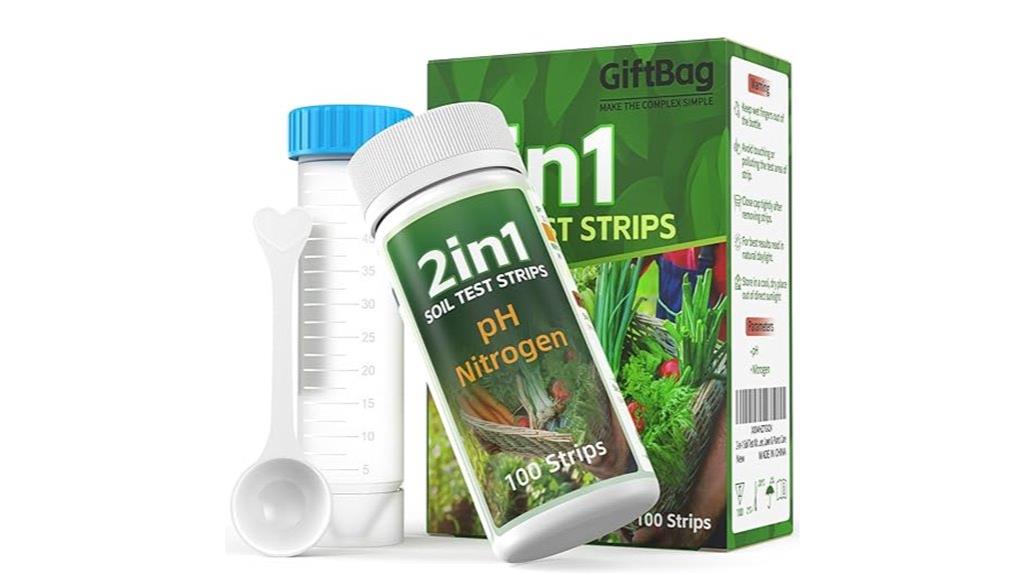
The GiftBag 2-in-1 Soil Test Kit is perfect for gardeners, homeowners, and small-scale farmers who want quick, reliable insights into their soil’s pH and nitrogen levels without the need for professional lab analysis. It includes 100 test strips, a soil sampling spoon, and detailed instructions, making testing straightforward. To use it, you add soil to a centrifuge tube, shake with water, wait 30 minutes, then dip a test strip into the solution. After 60 seconds, compare the color to the chart. This kit helps you monitor soil health accurately, so you can adjust fertilization and improve plant growth effectively.
Best For: home gardeners, small-scale farmers, and homeowners seeking an easy and affordable way to monitor soil pH and nitrogen levels for healthier plants.
Pros:
- User-friendly with clear instructions, suitable for non-professionals
- Includes a large quantity of test strips (100), allowing for multiple tests over time
- Provides quick and reliable results to help optimize soil conditions
Cons:
- Some users report inconsistent nitrogen readings or no color change on test strips
- Results can be affected by water quality or improper test procedures
- Semi-quantitative, requiring multiple tests for precise soil analysis
Soil Test Kit for pH, Nitrogen, Phosphorus, Potassium (40 Tests)
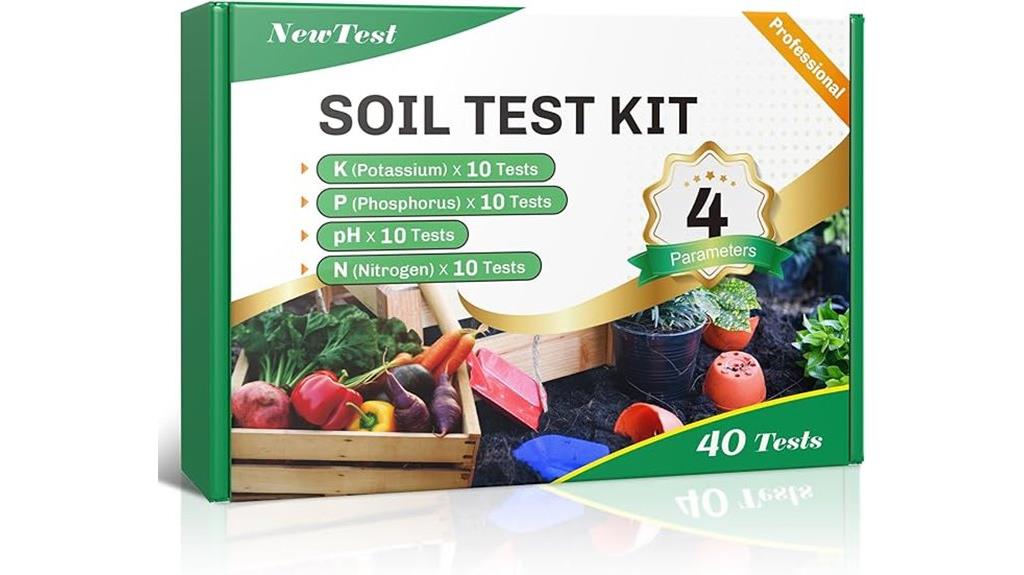
A soil test kit that measures pH, nitrogen, phosphorus, and potassium with 40 tests is ideal for gardeners and growers who want reliable, detailed insights into their soil’s nutrient levels. It includes 10 tests per parameter, making it suitable for ongoing monitoring of lawns, vegetable gardens, or flower beds. The kit is easy to use, with clear colorimetric results and step-by-step instructions that even beginners can follow. Made in the USA, it offers professional accuracy in a compact design. By understanding your soil’s chemistry, you can optimize fertilization, improve plant health, and ensure your garden thrives.
Best For: home gardeners, professional landscapers, and soil enthusiasts seeking accurate, easy-to-use soil testing for ongoing garden health monitoring.
Pros:
- Provides reliable, professional-grade results suitable for both beginners and experienced gardeners.
- Includes 40 tests, allowing for repeated soil assessments and monitoring over time.
- Works with all soil types and media, including hydroponics and soil-less environments.
Cons:
- Some users may find uncertainty about optimal nutrient levels, especially for nitrogen.
- The need to compare colorimetric results to cards may require careful attention for accuracy.
- Limited to 10 tests per parameter, which might not be sufficient for very large or highly variable soil areas.
Soil pH Test Kit with 125 Test Strips and Measuring Cylinders
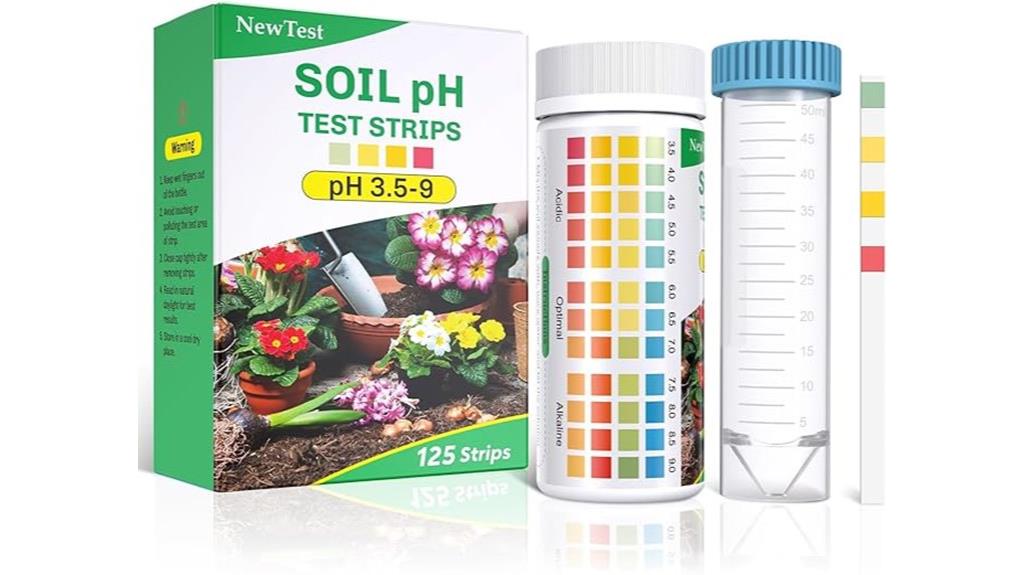
Designed with both beginners and experienced gardeners in mind, this Soil pH Test Kit offers 125 high-quality test strips and measuring cylinders to guarantee accurate readings across multiple garden zones. The test strips feature four color blocks for precise pH detection, reducing errors, while the measuring cylinders ensure correct sample proportions. Clear instructions guide you through sample collection, mixing, and reading results, making testing straightforward. The large number of strips allows for repeated testing over time, helping you monitor soil conditions easily. While some users note minor discrepancies compared to lab results, proper sample prep and following the instructions assure reliable, professional-level insights into your soil’s pH.
Best For: home gardeners, both beginners and experienced, seeking an affordable, reliable way to monitor and optimize soil pH for healthy plant growth.
Pros:
- Includes 125 test strips and measuring cylinders for multiple uses over time
- Easy-to-follow instructions with a clear color chart for accurate readings
- Suitable for various garden types, from flower beds to vegetable patches
Cons:
- Some users experience discrepancies between strip results and professional lab measurements
- Cloudy or impure soil samples can affect test accuracy
- Color interpretation may vary slightly between users, requiring careful comparison
Soil Test Kit for pH, Nitrogen, Phosphorus, Potassium
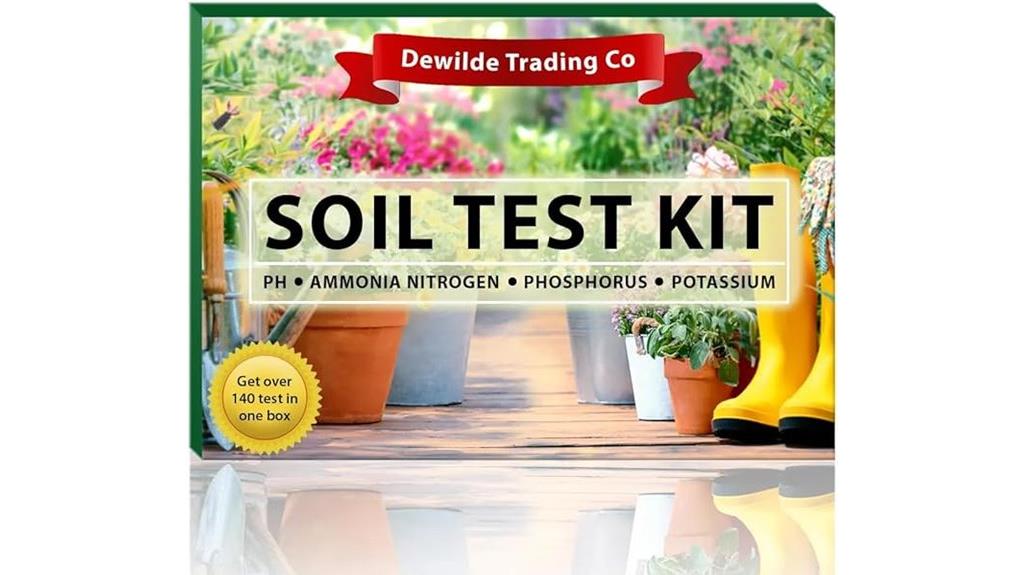
If you’re looking to understand your soil’s health all-encompassing, liquid soil test kits measuring pH, nitrogen, phosphorus, and potassium offer a practical solution. These kits provide detailed evaluations of key nutrients and conditions, with about 140 tests covering each parameter. They support better soil management, higher yields, and healthier plants by enabling precise fertilizer adjustments. While generally user-friendly, some users report inconsistencies, especially with phosphorus and potassium results. The kit’s quality varies, but it remains an affordable, quick option for gardeners and farmers alike to assess soil fertility, make informed decisions, and optimize plant growth effectively.
Best For: home gardeners, small-scale farmers, and horticulturists seeking a quick, affordable way to assess soil nutrient levels and pH for better plant health and productivity.
Pros:
- Provides comprehensive evaluation of key soil parameters with approximately 140 tests.
- Easy to use and offers rapid results, enabling timely soil management decisions.
- Affordable option that supports personalized fertilizer recommendations and enhances plant growth.
Cons:
- Inconsistent accuracy reported, particularly for phosphorus and potassium tests.
- Quality issues such as cracked tubes and torn pipettes may affect reliability.
- Some users find the color interpretation ambiguous, leading to potential misreading of results.
4-in-1 Soil Moisture Meter with pH, Temperature, and Light Testing
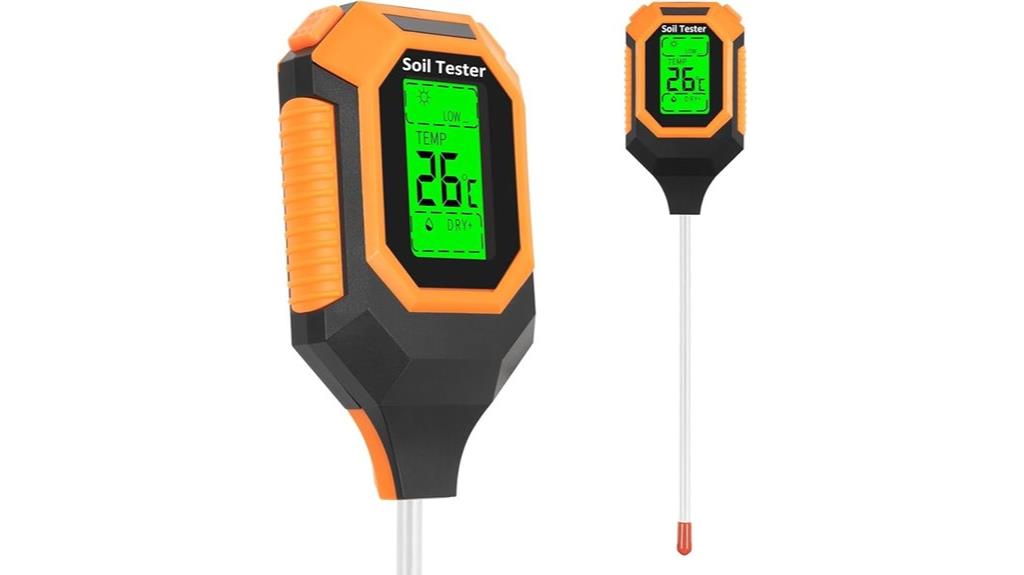
The in-1 Soil Moisture Meter with pH, Temperature, and Light Testing stands out as an ideal tool for gardeners and plant enthusiasts who want quick, accurate insights into their soil conditions. This digital device measures soil pH, moisture, temperature, and sunlight intensity with ease, thanks to a large backlit LCD display. Simply insert the probe into soil, wait a few seconds, and get reliable readings. Its advanced detection technology ensures precision, helping you make informed watering, fertilizing, and lighting decisions. Compact and user-friendly, it’s perfect for indoor, outdoor, garden, or farm use, making soil testing straightforward and efficient.
Best For: gardeners, indoor plant owners, and farmers seeking quick, accurate soil condition measurements to optimize plant health.
Pros:
- Provides comprehensive readings for soil pH, moisture, temperature, and light with a single device.
- Easy to use with a simple probe insertion and minimal controls, suitable for beginners.
- Equipped with a large backlit LCD display for clear readings in any lighting conditions.
Cons:
- Requires three AAA batteries (not included), which may be an extra purchase.
- The probe may need cleaning or replacement over time with frequent use.
- Limited to manual testing; no automatic or wireless data recording options.
4-in-1 Digital Soil Moisture Meter for Gardening
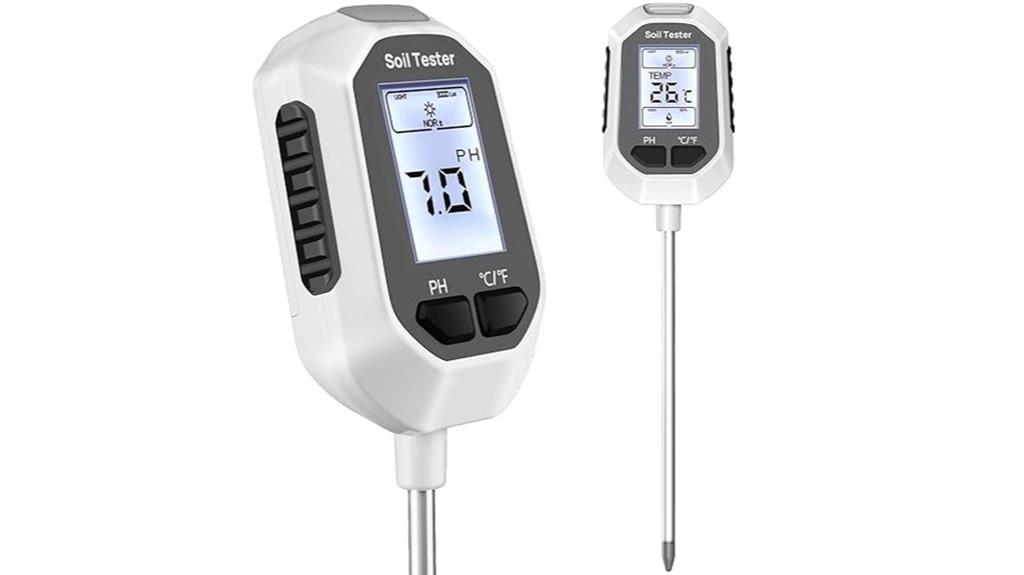
A standout feature of the in-1 Digital Soil Moisture Meter is its multifunctionality, making it ideal for gardeners who want to monitor soil moisture, pH, temperature, and sunlight with a single device. Its large LCD with backlight ensures easy readings day or night, while the tilting head design offers better visibility without bending. Simply insert the probes into soil, wait 10 seconds, and read the results—perfect for indoor and outdoor use. The device helps optimize watering, pH adjustments, and light management, all in one compact, user-friendly tool. Its quick, accurate measurements make caring for your plants more precise and efficient.
Best For: home gardeners and indoor plant enthusiasts seeking an all-in-one, easy-to-use soil testing device for precise plant care.
Pros:
- Multifunctional design measures soil moisture, pH, temperature, and sunlight with a single device.
- Large LCD display with backlight ensures clear readings day or night.
- Portable, lightweight, and user-friendly, suitable for both indoor and outdoor use.
Cons:
- Variability in moisture readings depending on soil type and depth can affect accuracy.
- Light sensor may be unreliable under artificial lighting or indoor conditions.
- Some users find the buttons for mode switching unintuitive, risking accidental activation.
6-in-1 Soil Moisture Meter for Gardening and Farming
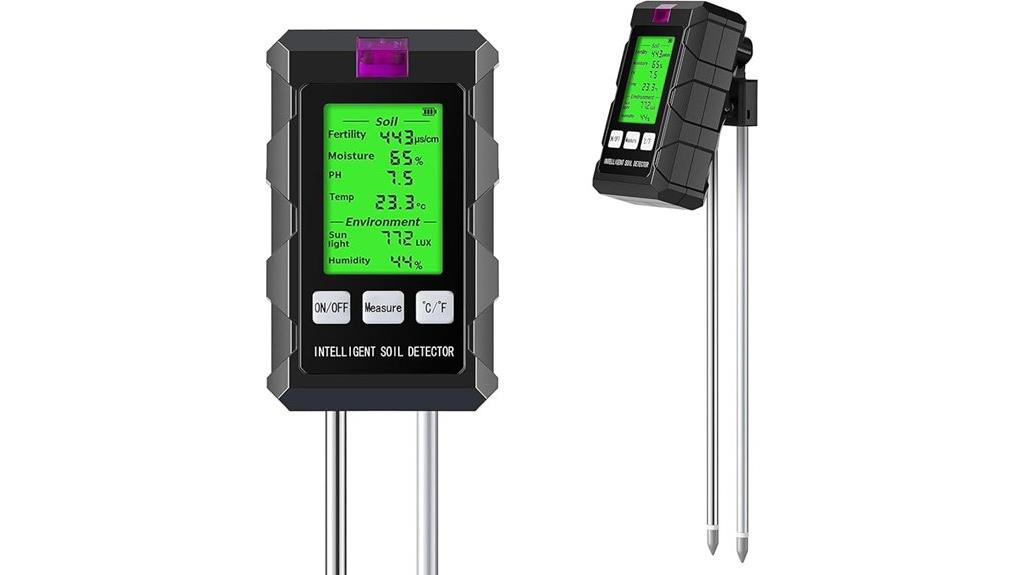
For gardeners and farmers seeking an all-encompassing tool, the 6-in-1 Soil Moisture Meter stands out by measuring moisture, pH, temperature, sunlight, air humidity, and soil fertility all in one device. Its professional-grade sensors provide accurate readings, helping you determine the best watering times, pH adjustments, and light exposure. The clear LCD display makes reading measurements quick and easy, while its portable design lets you test in various outdoor settings. Powered by 2 AAA batteries, it’s suitable for farms, gardens, and lawns, offering a comprehensive view of your soil conditions to support healthy plant growth.
Best For: gardeners and farmers seeking a comprehensive, all-in-one tool to monitor soil and environmental conditions for optimal plant growth.
Pros:
- Provides accurate, professional-grade readings of moisture, pH, temperature, sunlight, air humidity, and soil fertility in one device.
- Features a clear LCD display for quick and easy interpretation of measurements.
- Portable and powered by 2 AAA batteries, suitable for various outdoor environments.
Cons:
- Requires 2 AAA batteries (not included), which may be an added cost or inconvenience.
- May have a learning curve for beginners unfamiliar with interpreting multiple environmental readings.
- The device’s sensors might need calibration over time for sustained accuracy.
7 in 1 Soil Tester Kit: NPK, pH, Temperature, Moisture & Conductivity
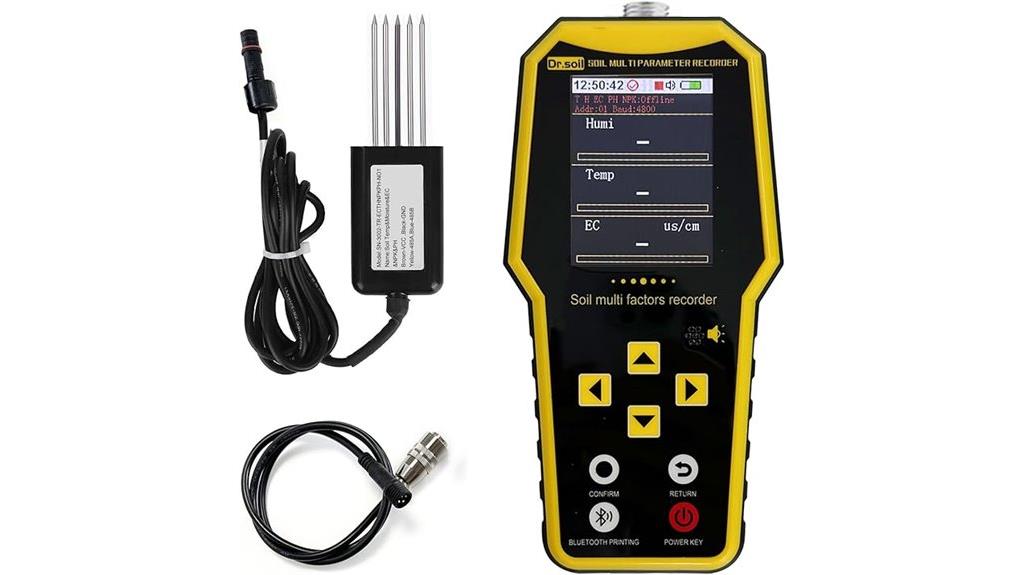
If you want an all-encompassing soil analysis tool that simplifies monitoring multiple factors at once, the 7-in-1 Soil Tester Kit is an excellent choice. It measures NPK, pH, temperature, moisture, and conductivity, giving you a comprehensive view of your soil’s health. The device features a large LCD screen with a full-color interface, making readings easy to see even in low light. Its portable, durable design with a secure clip-on system allows for quick, accurate testing in various environments. With data storage for up to 100,000 points and easy export options, this kit streamlines soil management and helps you optimize your garden’s growth potential.
Best For: gardeners, farmers, environmental scientists, and professionals needing comprehensive soil analysis for optimal plant growth and soil management.
Pros:
- Provides multi-parameter measurement including NPK, pH, temperature, moisture, and conductivity for holistic soil health assessment.
- Large LCD screen with full-color interface and backlit display ensures easy reading in various lighting conditions.
- High data storage capacity (up to 100,000 points) and convenient export options streamline data management and analysis.
Cons:
- Durability concerns reported by some users for long-term use, requiring careful handling.
- Battery life may necessitate frequent recharging with a charging time of up to 8 hours.
- Slightly bulky design may be less convenient for very tight or difficult-to-access testing environments.
Soil Test Kit for Garden Lawn (4-in-1, 40 Tests)
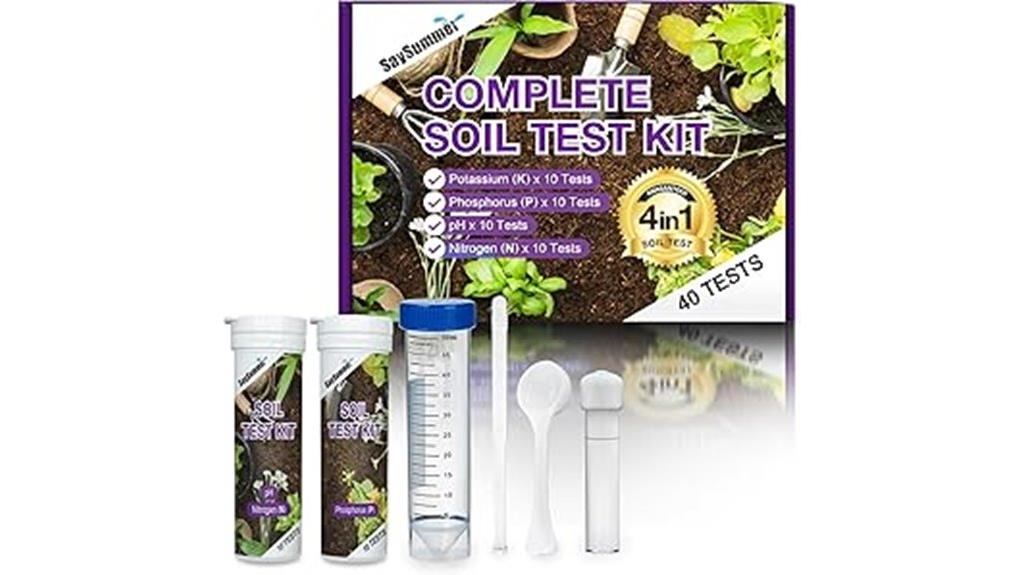
Garden Soil Test Kits are perfect for gardeners who want quick, reliable results to maintain healthy lawns and garden beds. The Soil Test Kit for Garden Lawn (4-in-1, 40 Tests) provides accurate measurements of pH, nitrogen, phosphorus, and potassium, essential nutrients for plant health. It includes all necessary tools and easy-to-follow instructions, making testing straightforward. With 40 tests, it’s ideal for routine soil checks, whether you’re managing lawns, flower beds, or vegetable gardens. Customers praise its accuracy, affordability, and ease of use, helping you make informed decisions for best soil conditions and thriving plants.
Best For: home gardeners, lawn care enthusiasts, and greenhouse growers seeking quick, reliable soil testing to maintain healthy plants and optimize soil conditions.
Pros:
- Provides accurate measurements of pH, nitrogen, phosphorus, and potassium with 40 tests included.
- User-friendly with clear instructions, making soil testing straightforward for beginners.
- Compact and lightweight design, suitable for indoor and outdoor use, and easy to store.
Cons:
- Reagent tablets come in three types, which may require careful attention to correct usage.
- Results are approximate and intended for routine assessments rather than detailed laboratory analysis.
- No digital readout; relies on color charts which may be subjective to some users.
Factors to Consider When Choosing Garden Soil Test Kits
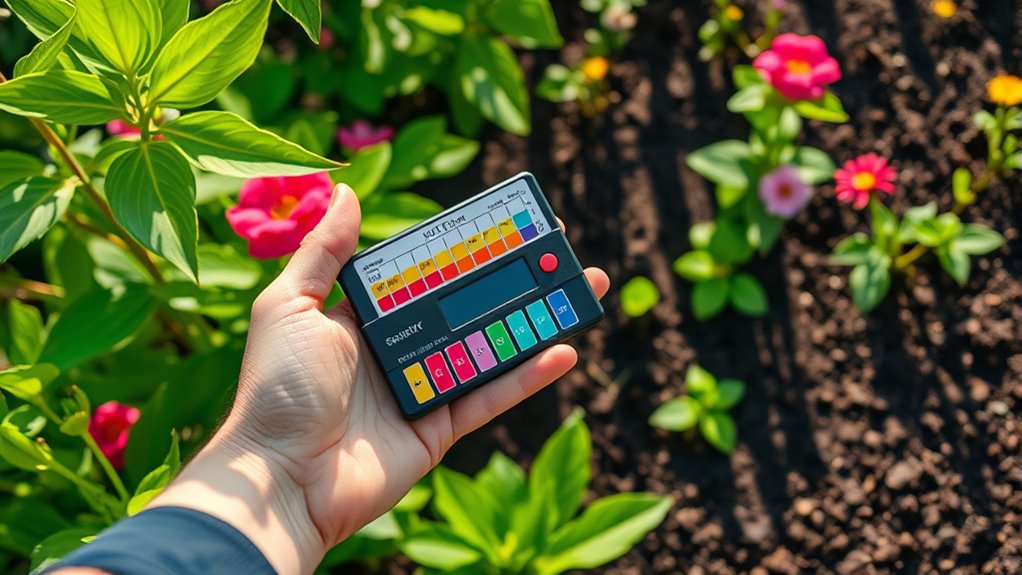
When selecting a garden soil test kit, I focus on accuracy and ease of use to get reliable results without frustration. I also consider which testing parameters are most important for my garden’s needs and whether the kit is compatible with my soil type. Ultimately, I weigh the cost against the overall value to make sure I choose a kit that fits my budget and gardening goals.
Accuracy and Precision
Choosing a garden soil test kit requires careful consideration of both accuracy and precision to guarantee reliable results. Accurate kits provide trustworthy measurements of pH, nutrients, and other key parameters, helping you make informed soil amendments. Precision depends on the quality of reagents, calibration, and how well you follow testing instructions. While colorimetric strips and liquid reagents can vary in accuracy, lab-grade or digital meters generally offer higher precision. Proper sample collection—testing from multiple locations and depths—also improves overall accuracy. Consistency in testing procedures and understanding each kit’s limitations are essential for trustworthy, repeatable results. By prioritizing both accuracy and precision, you ensure your garden receives the right care for healthy, thriving plants.
Ease of Use
Selecting a soil test kit that’s easy to use can make the testing process much more accessible, especially for beginners or those without technical experience. Look for kits with clear, step-by-step instructions that guide you through sample collection, preparation, and testing, ensuring accurate results without guesswork. Visual indicators like color charts, digital displays, or simple dial gauges make it quick to interpret your results and reduce confusion. A straightforward design with minimal components—such as easy-to-insert probes or strips—helps prevent handling errors and simplifies the process. Portability and ergonomic features also matter, allowing you to test your soil comfortably in various locations. Ultimately, a user-friendly kit makes soil testing less intimidating and more reliable, so you can confidently improve your garden’s health.
Testing Parameters
Understanding the key testing parameters in garden soil kits is essential for evaluating your soil’s health accurately. These parameters typically include pH, nitrogen, phosphorus, potassium, moisture, and light levels—factors that directly impact plant growth. Accurate pH measurements often use colorimetric strips or electronic meters, covering a range from 3 to 10. Nutrient testing quantifies essential elements like NPK, with some kits also measuring secondary nutrients such as magnesium and calcium. Soil moisture and light levels are measured to help optimize watering and ensure plants receive enough sunlight. The number of tests included per parameter affects reliability; some kits offer as few as 10 tests, while others provide over 100, allowing for more frequent monitoring and better soil management.
Soil Compatibility
When evaluating garden soil test kits, it’s important to contemplate how well they work with your specific soil type. Different soils—clay, loam, sandy, or rocky—can affect test accuracy, so choose a kit compatible with these variations. Check if the testing methods suit your soil’s conditions, including pH ranges and nutrient levels, to ensure reliable results. Make sure the device’s probe or testing strips can reach the depth relevant to your plant roots for precise measurements. Consider whether the kit performs well in your soil’s texture and moisture level; some kits are less effective in very dry, loose, or compacted soils. Ultimately, verify that the calibration and measurement ranges match your soil’s characteristics to avoid inaccuracies caused by incompatibility.
Cost and Value
Choosing the right garden soil test kit depends heavily on your budget and what you need from the test. Prices vary widely—from under $10 for basic strips to over $100 for advanced electronic meters—so it’s important to contemplate value. Look at the number of tests included; larger kits often provide better long-term value, especially if you plan ongoing monitoring. Kits that measure multiple parameters like pH, nutrients, and moisture are usually more cost-effective than buying separate tests. Don’t forget to evaluate accuracy and reliability—cheaper options might sacrifice precision, which impacts results. Investing in a higher-quality kit with durable components and clear instructions can save you money over time by reducing repeat tests and providing more accurate, useful data.
Durability and Quality
Durability and quality are essential factors when selecting a garden soil test kit because they directly affect the kit’s longevity and accuracy. High-quality kits feature corrosion-resistant probes made of sturdy materials like stainless steel, ensuring they withstand soil contact over time. A weatherproof design is vital for outdoor use, protecting components from moisture, dirt, and temperature changes. Reliable kits include sturdy, easy-to-clean containers and high-quality color charts or digital displays that provide precise readings. Durability also means maintaining calibration and accuracy through repeated use without sensitive parts degrading. Choosing well-constructed kits with reinforced probes and durable components helps prevent breakage or malfunction, ensuring consistent, accurate results season after season. Investing in quality means your kit remains reliable and effective for years to come.
Result Interpretation
Interpreting soil test results accurately is key to making informed decisions about soil amendments and plant health. To do this, I focus on understanding the colorimetric or analog readings and matching them carefully to the provided charts or scales. Consistent results hinge on proper sample collection, preparation, and testing—skipping steps can lead to misreading. Many kits include reference ranges for parameters like pH, nitrogen, and nutrients, helping me assess whether my soil is ideal or needs adjustments. I pay close attention to these ranges and consider my plants’ specific needs to avoid improper amendments. Some kits offer detailed guidance or digital tools, making it easier to translate raw data into actionable insights. Clear interpretation ensures I give my garden the right care it needs to thrive.
Brand Reputation
Since a trusted brand often means consistent quality, I pay close attention to a soil test kit’s reputation before making a purchase. A reputable brand usually has positive reviews, high ratings, and reliable product quality, which builds my confidence in its accuracy. Well-known brands often provide excellent customer support, warranties, and clear instructions, making the testing process easier. Established brands tend to have a proven track record of accurate results and durable devices, reducing the risk of calibration issues or malfunctions. I also look for industry awards, certifications, or endorsements from gardening professionals, as these add credibility. Choosing a trusted brand helps me avoid counterfeit or substandard products, ensuring safe and effective soil analysis for my garden’s health.
Frequently Asked Questions
How Often Should I Test My Garden Soil for Optimal Growth?
You might be wondering how often to test your garden soil for best growth. I recommend testing at least once a year, ideally in early spring before planting. If you notice poor plant health or changes in growth, consider testing more frequently. Regular testing helps you adjust soil pH and nutrient levels, ensuring your plants thrive. Staying proactive with soil health keeps your garden vibrant and productive.
Can Soil Test Kits Detect Contaminants or Only Nutrients?
Back in the day, soil testing was like finding a needle in a haystack. Today, most garden soil test kits primarily detect nutrients like nitrogen, phosphorus, and potassium. Some advanced kits can identify certain contaminants, but they’re not as exhaustive as professional lab tests. If you’re worried about toxins or pollutants, I’d suggest sending a sample to a lab for a detailed analysis.
Are Digital Soil Testers More Accurate Than Chemical Test Strips?
I find digital soil testers generally more accurate than chemical test strips because they provide quick, quantifiable results for pH and nutrients. Digital testers use electronic sensors that give consistent readings, while chemical strips can be affected by user error or environmental factors. However, I always double-check with lab tests for critical decisions. For everyday gardening, though, digital testers are reliable and convenient.
How Do I Interpret Soil Test Results for Specific Plants?
I know soil test results can seem confusing at first, but interpreting them for specific plants is simpler than you think. I focus on key nutrients like nitrogen, phosphorus, and potassium, adjusting levels based on the plant’s needs. For example, tomatoes thrive with high phosphorus. Think of it as a recipe—each plant has its perfect soil mix, and your test results guide you to get it just right.
Do Soil Test Kits Work for All Soil Types and Climates?
I’ve found that soil test kits generally work well across different soil types and climates, but their accuracy can vary. For best results, I follow the instructions carefully and consider local conditions. Some kits are better suited for specific soils or climates, so I choose one tailored to my area. Regular testing helps me understand my soil’s unique needs and adjust my gardening practices accordingly.
Conclusion
Choosing the right soil test kit can make all the difference in growing a healthy, thriving garden. With so many options available, it’s easy to feel overwhelmed. But don’t you want to guarantee your plants get the nutrients they need? By selecting a reliable kit, you’ll be well on your way to better soil health and bountiful harvests. Ready to dig in and start testing? Your garden’s future depends on it!

